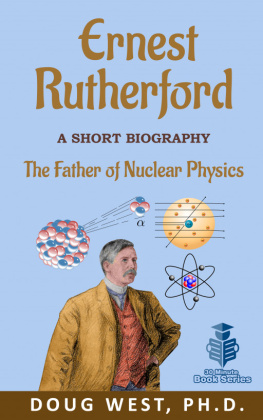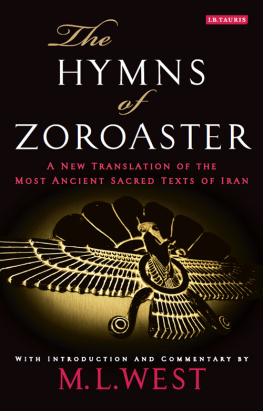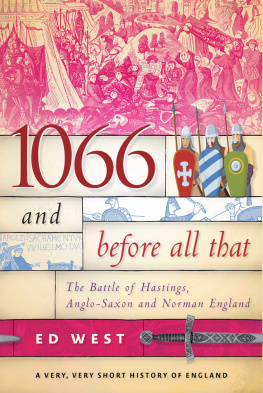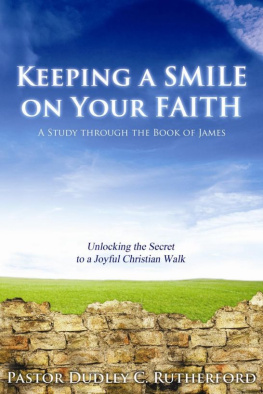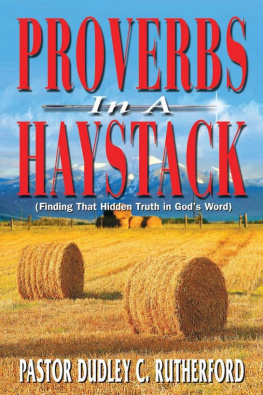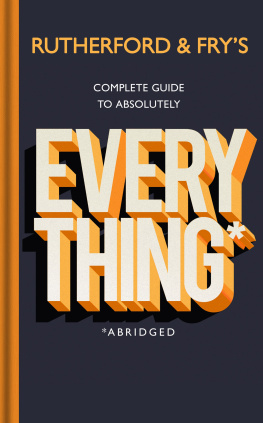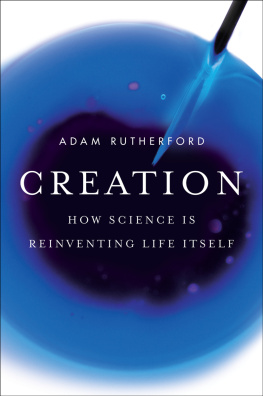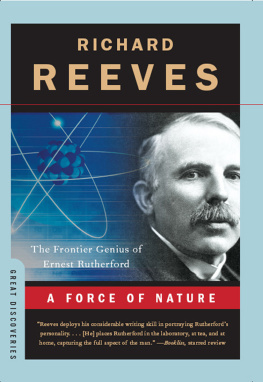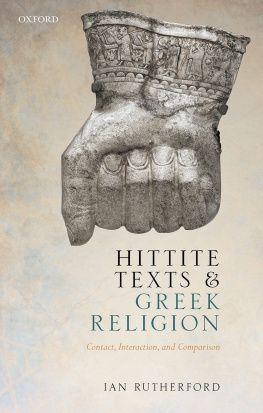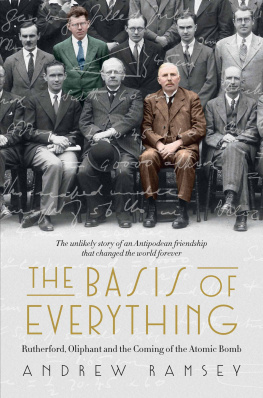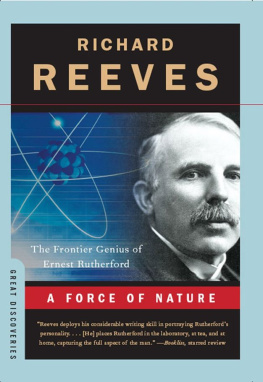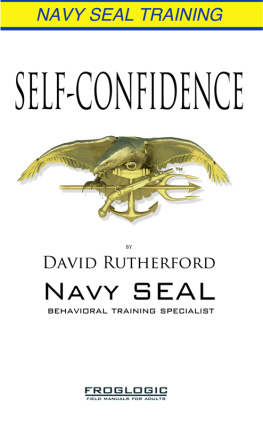Ernest Rutherford: A Short Biography
The Father of Nuclear Physics
By Doug West, Ph.D.
Ernest Rutherford: A Short Biography
The Father of Nuclear Physics
Copyright 2018 Doug West
All Rights Reserved. No part of this book may bereproduced in any form without written permission from the author.Reviewers may quote brief passages in reviews.
Smashwords Edition, License Notes
This ebook is licensed for your personal enjoymentonly. This ebook may not be re-sold or given away to other people.If you would like to share this book with another person, pleasepurchase an additional copy for each recipient. If youre readingthis book and did not purchase it, or it was not purchased for youruse only, then please return to your favorite ebook retailer andpurchase your own copy. Thank you for respecting the hard work ofthis author.
For my grandson Aiden
Table of Contents
Preface
Welcome to the book, Ernest Rutherford: AShort Biography. This book is volume 34 of the 30 Minute BookSeries and, as the name of the series implies, if you are anaverage reader this book will take around 30 minutes to read. Sincethis short book is not meant to be an all-encompassing biography ofErnest Rutherford, you may want to know more about this man and hisaccomplishments. To help you with this, there are several goodreferences at the end of this book. I have also provided aTimeline, in order to link together the important events inRutherfords life, and a section titled Biographical Sketcheswhich includes biographies of some of the key individuals in thebook.
Thank you for purchasing this book, and Ihope you enjoy your time reading about this legendarytwentieth-century scientist.
Doug West
December 2018
Introduction
In the movies we see the scientist portrayedas a quiet and pious man or woman dressed in a white lab coatengrossed in thought. This image surely fits some; however, not thetwentieth-century New Zealander Ernest Rutherford, or LordRutherford as he would be known later in life. He was born into alarge family living in the frontier country of New Zealand with thenearest town thirteen miles away by horseback. This young man wouldearn a scholarship and travel to England to study at theworld-famous Cambridge University. There this boisterous countryboy would come into his own in the hallowed halls of Cambridge.Over his long and illustrious career as a physicist, he wouldcreate the science we call today nuclear physics, thus shatteringthe concept of the atom that had held sway since the time of theancient Greek philosophers. In his day, Rutherford was consideredthe greatest experimental physicist in the British Empire. No otherexperimentalist had been so influential since Michael Faraday, thediscoverer of electromagnetic induction.
Chapter 1 - Growing Up in New Zealand
We are ratherlike children, who must take a watch to pieces to see how itworks. Ernest Rutherford
The Rutherford family migrated from Scotlandto the South Island of New Zealand in 1843. They were some of theearly settlers on the island, which had only a few thousand whiteinhabitants. In this rough and beautiful land, Ernest Rutherfordwas born the fourth of twelve children on August 30, 1871, in thesettlement of Brightwater, south of the town of Nelson. His father,James Rutherford, was a farmer and was involved in making wagonwheels, running a flax mill, and making rope. Ernests mother,Martha, was an educated women and taught school. Other than thechildren, her pride and joy was a Broadwood piano from England; shewas said to polish it every day. Years after Ernest became famous,Martha wrote of her young son growing up in New Zealand: At onetime he had a passion for taking photographs of his family,brothers and sisters, with a homemade camera, and he wascontinually taking clocks to pieces. Reading was his greatrecreation. Anything seemed to interest him, even the very lightestof literature. He was especially fond of Dickens when young andwould welcome any opportunity to read out loud to younger membersof the family Rutherford was no different from most young boysgrowing up in the country. He enjoyed hunting, fishing, ridinghorses, exploring nature, and the mischief only youngsters candream up.
As a young boy Ernest worked on the familyfarm and showed great promise at the local school. With the help ofa scholarship, he was able to attend Canterbury College inChristchurch, one of the four campuses of the New ZealandUniversity. At the small college, with only seven professors, hebecame interested in physics and developed a magnetic detector forradio waves. He was active in the school, playing rugby andbecoming a member of the debate team. He completed his Bachelor ofArts degree in 1892 and continued the following year to complete aMasters with first-class honors in physical science andmathematics. During his college years he fell in love with MaryNewton, the daughter of the woman he boarded with. Marys fatherhad died from alcoholism, and her mother was head of the localtemperance society.
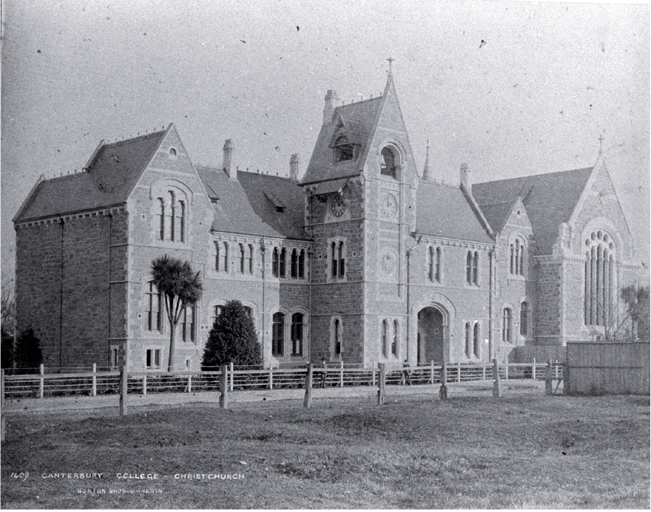
Figure Canterbury College in Christchurch, NewZealand, circa 1882.
With his college degrees in hand, heattempted unsuccessfully to obtain a job as a school teacher.Undeterred, he decided to continue his education and participatedin a scholarship competition that would allow him to attendCambridge University in England. The scholarship was to bring thebest students from the far reaches of the British Empire to studyat Cambridge or Oxford Universities. He finished second in thecompetition but got lucky because the first place winner decided tostay in New Zealand and get married. The news of the scholarshipreached Rutherford while he was digging potatoes on the familyfarm, and as the story goes, he threw down the spade and said,Thats the last potato Ill dig. He set sail for England, leavinghis family and his fianc, Mary, behind.
With money he had mostly borrowed from hisbrother, Rutherford set sail from Christchurch in August 1895. Onthe way to London, the ship docked in Australia and he sought outAustralias most famous physicist, William Henry Bragg of AdelaideUniversity. Bragg would become important in the career of thebudding young scientist.
Chapter 2 - Cambridge University
We havent gotthe money, so weve got to think! Ernest Rutherford
Arriving in London, the cold damp air andsoot didnt suit Rutherford, and he promptly came down with a badcold, keeping him in bed at that boarding house for several days.Feeling better, he took the hour-long train ride out of the city tothe Cavendish Laboratory to connect with his new mentor, J.J.Thomson, Europes leading expert on electromagnetic radiation.Rutherford wrote to his mother of the meeting with Thomson, I wentto the Lab and saw Thomson and had a good long talk with him. He isvery pleasant in conversation and is not fossilized at all.Thomson and Rutherford would become lifelong friends, and Mrs.Thomson became like a second mother to the young man who hadtraveled twelve-thousand miles to study. Though the Thomsons werefriendly toward Rutherford, his fellow students were not.Rutherford was one of the first two students admitted to graduatestudy at Cambridge that had not graduated from a BritishUniversity. This new policy of admitting colonials to theuniversity caused resentment among the self-proclaimed elites wholooked down upon the outsidersthis would change. A fellow studentfrom France, Paul Langevin, was asked years later whetherRutherford was very friendly and responded, One can hardly speakof being friendly with a force of nature.

